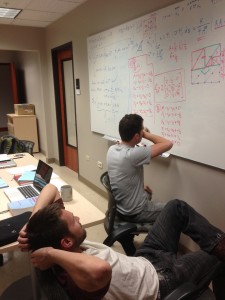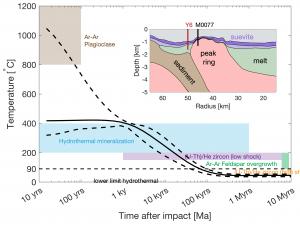Work in the Geological Fluid Mechanics Group
 Our group is very diverse, current students are enrolled in PhD programs in Geological Sciences (this includes Geophysics), Petroleum and Geosystems Engineering, and Computational Science Engineering and Mathematics and they have undergraduate degrees in the Geosciences, Engineering, and Physics. All have a quantitative background and share an interest in mathematical modeling and numerical simulation of complex geosystems and the dynamics of flow in porous media. The new Graduate Portfolio Program in Computational Geosciences (starting Fall 2013) forms the backbone of the graduate education in our group. This new program is a first-of-a-kind interdisciplinary graduate program designed to educate tomorrow’s leaders in computational and quantitative geosciences. Dr. Hesse teaches a sequence of graduate courses focussed on porous media that tightly integrate mathematical modeling and numerical simulation and provide the background required for advanced graduate work.
Our group is very diverse, current students are enrolled in PhD programs in Geological Sciences (this includes Geophysics), Petroleum and Geosystems Engineering, and Computational Science Engineering and Mathematics and they have undergraduate degrees in the Geosciences, Engineering, and Physics. All have a quantitative background and share an interest in mathematical modeling and numerical simulation of complex geosystems and the dynamics of flow in porous media. The new Graduate Portfolio Program in Computational Geosciences (starting Fall 2013) forms the backbone of the graduate education in our group. This new program is a first-of-a-kind interdisciplinary graduate program designed to educate tomorrow’s leaders in computational and quantitative geosciences. Dr. Hesse teaches a sequence of graduate courses focussed on porous media that tightly integrate mathematical modeling and numerical simulation and provide the background required for advanced graduate work.
Graduate students are generally expected identify an important problem in the Earth and environmental sciences, develop appropriate and most likely new mathematical models. The course work will provide students with the skills to analyze their model and to develop appropriate numerical solutions. The group has a strong esprit de corps and graduate students share skills and help each other with problem shooting.
Scientific Computing Projects for undergraduates
I regularly advise Scientific Computing Projects for undergraduates enrolled in the Computational Science and Engineering (CSE) Certificate Program or undergraduate theses for students in the BSc in Computational Engineering degree. Any student interested in working with me must first complete my class GEO 325M Numerical Modeling in the Geosciences.
Postdoctoral Opportunities
The Jackson School of Geosciences provides competitive Postdoctoral Fellowships for outstanding young scientists in all areas of the Geosciences. Applicants with independent funding can contact Marc Hesse directly.
Current PhD Opportunities
I am currently looking for new graduate students starting in the fall 2019 in the following areas. If you are interested, please contact me directly.
Recolonization of Chixculub impact crater
 The Geological Fluid Mechanics Group has a new NASA funded project modeling the Recolonization of the Chicxulub impact crater. The objective of this proposal is to further our understanding of the role impact craters play in the habitability of terrestrial planets. Despite the recognized importance of impact cratering as a geologic process that can generate subsurface habitats (Osinski 2020), little is known about the pathways that lead to the colonization of impact rocks. Recent observations from the International Ocean Discovery Program-International Continental scientific Drilling Program (IODP-ICDP) Expedition 364 to drill the peak ring of the Chicxulub impact structure provide new constraints on the habitability of impact sites. Here we propose to use the post-impact hydrothermal system at the Chicxulub crater as an analog to study the pathways for microbial colonization of the subsurface habitat created by the impact. Our work is motivated by the following three scientific questions:
The Geological Fluid Mechanics Group has a new NASA funded project modeling the Recolonization of the Chicxulub impact crater. The objective of this proposal is to further our understanding of the role impact craters play in the habitability of terrestrial planets. Despite the recognized importance of impact cratering as a geologic process that can generate subsurface habitats (Osinski 2020), little is known about the pathways that lead to the colonization of impact rocks. Recent observations from the International Ocean Discovery Program-International Continental scientific Drilling Program (IODP-ICDP) Expedition 364 to drill the peak ring of the Chicxulub impact structure provide new constraints on the habitability of impact sites. Here we propose to use the post-impact hydrothermal system at the Chicxulub crater as an analog to study the pathways for microbial colonization of the subsurface habitat created by the impact. Our work is motivated by the following three scientific questions:
The University of Texas at Austin is an Affirmative Action / Equal Opportunity Employer.
Posted – 11/15/2024

